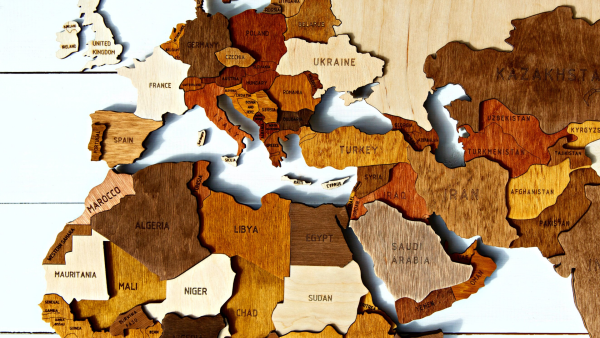There is no doubt that the current drums of war rolling between the West and Russia over tensions in Ukraine are more serious than ever. Whether diplomacy will be able to curb the chances of a World War III strongly feared by all sides or developments continue to escalate, the global economy might suffer a new blow.
With every passing day, the Ukrainian crisis gets a little more complicated and political statements get a little more heated. Western NATO, led by the US, has warned of an imminent Russian invasion of Ukraine, while Russia continues to deny such plans.
US President Biden again warns Russian leader Putin of swift and severe costs if Russia invades Ukraine pic.twitter.com/5JYRpxpKHe
— TRT World Now (@TRTWorldNow) February 13, 2022
As language between the two sides gets more intense, other uninvolved regions are bracing for the possible confrontation that could erupt between the world's leading and most-militarized powers. But we are not here to talk politics.
Here, in the Middle East and North Africa, it is important to be ready for the possible ramifications of the crisis on the region's economies, especially in terms of MENA imports from Ukraine, Russia, and Europe, which many countries in the region are greatly reliant on.
Impact on MENA Economies
Oil
In terms of energy, the world could be on the verge of a serious setback. Russia is the world's 3rd largest producer of oil, which means that any disruptions in its production rates could send oil prices to unprecedented highs, especially since it is already approaching record highs, exceeding $90 USD a barrel.
???? - Ukraine-Russia conflict would have huge impact on commodities markets
— Agathe Demarais (@AgatheDemarais) February 3, 2022
• Russia is major exporter of gas, wheat, oil, aluminium, copper
• Energy prices would spike, weighing on economic recovery
• Russian move in Ukraine would also cast doubts on Nord Stream 2's future pic.twitter.com/1AVdeBR9Va
Natural Gas
Russia ranks 2nd in the world in terms of production of natural gas, and while MENA countries do not mainly rely on it for gas, any escalation on the Ukrainian front could lead to a spike of prices, making the region's already challenging economic conditions face more obstacles.
Similarly, Ukraine is also a producer of natural gas, even though it is not the country's most significant export. Ukraine ranks 36th globally and its production does not cover its needs, which is why Kyiv relies mainly on European gas.
Wheat
Ukraine and Russia are amongst the biggest producers of wheat in the world. In the increasingly deserted MENA region, wheat from the two countries involved in the crisis accounts for about 29% of the world's needs, which means an extremely serious threat to food security in our region, especially since we are talking about the very main component of bread, the highly consumed food that is considered an integral part of the region's diet.
According to CNBC Arabia, Lebanon is the region's top importer of Ukrainian wheat, relying on it for about 50% of its needs. This means a greater danger of collapse for the country already struggling with an extremely challenging financial crisis. War-torn Libya and Yemen come in third and fourth places in terms of MENA reliance on Ukrainian grains.
#Ukraine accounts for 14% of the world's #corn & #wheat exports. Africa, the Middle East and China are among top recipients. About 3/4 of Ukraine's corn/wheat crop is exported, and nearly all that grain flows out of southern Black Sea ports Odessa & Mykolaiv ?? pic.twitter.com/f3idX1cM5a
— Karen Braun (@kannbwx) January 24, 2022
In 2020, about 50% of Ukrainian wheat was reportedly exported to the MENA region.
The risk posed by the potential confrontation on food security in the MENA is multifaceted. Not only does it threaten our part of the world with famine in case of production shortages amid lack of local grain farms, but tensions could also lead to skyrocketing prices that may not be affordable by most of the region's economies, the ones already battling decades of poverty and a recent pandemic.
Even though most MENA regions might not be involved politically or militarily in the looming conflict, it could still report strong negative complications, in the case the feared war flares up.
Written by Riham Darwish







